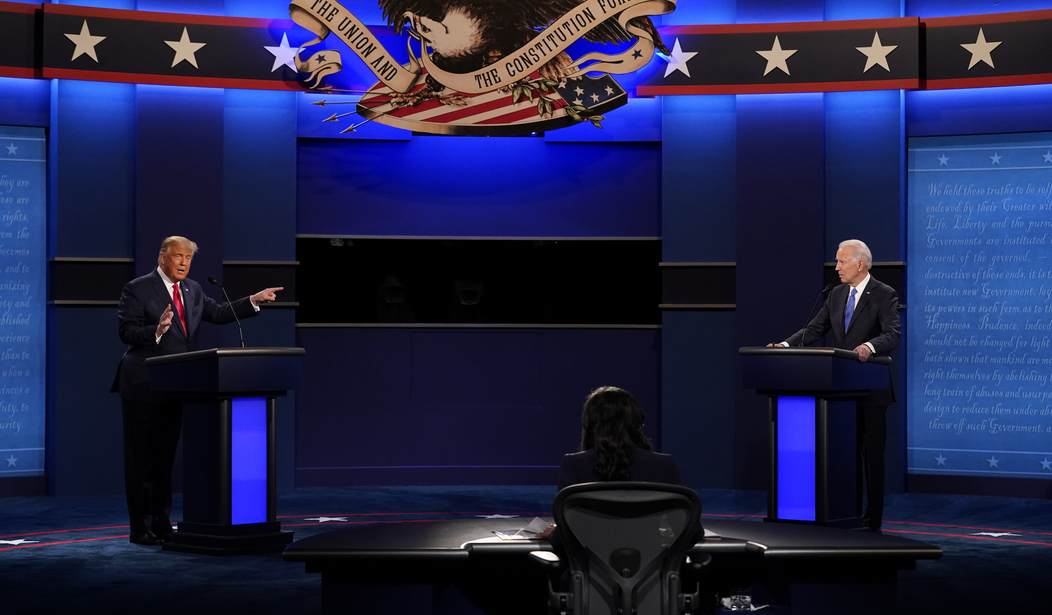The two most important takeaways from the final presidential debate are these: First, no Republican presidential nominee should agree ever again to a debate organized by the Commission on Presidential Debates (CPD)—at least without major reforms. Second, no such candidate should ever consent to a “mainstream media” moderator.
In the last presidential debate of the season the bias of Kristen Welker (NBC, MSNBC) was palpable: She repeatedly interrupted and quibbled with President Donald Trump, while presenting a much more respectful demeanor toward former Vice President Joe Biden.
But far worse was her selection of topics. These seem to have been drawn almost exclusively from the “progressive” agenda and from Democratic Party talking points. Notably, most were irrelevant to the president’s actual job description.
That job description is laid out in the U.S. Constitution, primarily in Sections 2 and 3 of Article II. The Constitution tells us that the president’s most important tasks are enforcing federal laws, nominating and appointing federal officers and judges, signing and vetoing bills, recommending measures to Congress, commanding the military, and (with some input from the Senate) conducting foreign affairs.
There is nothing in the president’s job description about health care or pandemics, ending pollution, or fighting institutional racism. With marginal exceptions, the Constitution assigns those duties to state officials. (That’s a major reason we have state officials!) Yet Welker treated these issues as if they were all determined by the Emperor—er, president.
It is clear, moreover, that the choice of questions was not just the result of constitutional ignorance. Consciously or not, her questions were crafted to put Trump at a disadvantage and Biden at an advantage.
Recommended
Originally, this was to be a debate about foreign policy—one of the president’s core constitutional responsibilities. In that area, Trump has much to boast about: the rapid defeat of Isis; brokering a deal whereby two more Arab states recognized Israel; transfer of our embassy to Jerusalem; the correction of our previously pro-China foreign policy; a successful insistence that our allies contribute more to NATO, and a successful renegotiation of NAFTA.
As well as the honor of being the first administration in a very long time to keep us out of war.
Perversely, therefore, the CPD decided there would be no debate dedicated to foreign policy. Instead, the questions were all about COVID-19, “institutional racism,” climate change, Russian election interference, minimum wage, Trump’s businesses—and yet more “institutional racism.”
By contrast, Welker was entirely incurious about issues that are, objectively speaking, of more long-term importance to the country. She also was incurious about the explosive scandal now surrounding Biden and his family.
Here are some questions that should have been asked but weren’t:
Foreign Policy:
* For both candidates: Communist China is increasingly becoming a military rather than merely an economic threat. How do you plan to address this problem?
* For Biden: Do you disagree with any of the president’s Middle Eastern policies, and if so how would you do things differently?
* For Biden: Would you renew the Obama administration’s agreement with Iran?
* For Biden: Do you disagree with any of the president’s European or NATO policies, and if so how would you do things differently?
Fiscal Issues and Regulation:
* For both candidates: Due to massive deficit spending by both parties over the past 50 years, the national debt is now at an alarming level and growing fast. Federal entitlement programs are headed toward bankruptcy. Do you have any plans to address the fiscal situation?
* For President Trump: Although Republicans often proclaim their fiscal responsibility, during your administration, deficits and debt have gotten much worse—even before COVID hit. Explain why your administration has not been more fiscally responsible.
* For Trump: You have placed a priority on de-regulation. But regulations can be re-imposed as long as the agencies issuing them continue to survive. Why have you not recommended the termination of more federal agencies, particularly those that merely duplicate state-level activities?
* For both candidates: Since the 1960s, federal involvement in health care has triggered an explosion in costs, pricing most Americans out of the health care market and thereby limiting access. Thus far, most of the solutions offered have involved additional federal programs, such as Obamacare, that have made the cost situation worse. What plans, if any, do you have for reducing the federal role in healthcare?
The Constitution and Judiciary:
* For both candidates: The Constitution clearly limits the federal government to certain functions, but it is widely ignoring constitutional limits. Many Americans distrust the federal government and believe it has become abusive. Do you agree, and if so how will you try to correct the situation?
* For both candidates: What is your stance on increasing the number of Supreme Court justices?
* For Biden: You claimed that the president’s nomination of Amy Coney Barrett is “unconstitutional,” but legal experts say that’s false. Why did you say it?
* For both candidates: What will be the criteria by which you appoint federal judges?
* For both candidates: Do you recommend any constitutional amendments? If so, which ones and why?
The Biden Scandal:
* For Biden: Was the recently-discovered laptop computer said to belong to Hunter Biden actually his property, and are its recorded emails accurate?
Robert G. Natelson, a former constitutional law professor, is Senior Fellow in Constitutional Jurisprudence at the Independence Institute in Denver, a Senior Adviser to the Convention of States movement, and author of The Original Constitution: What It Actually Said and Meant.

























Join the conversation as a VIP Member